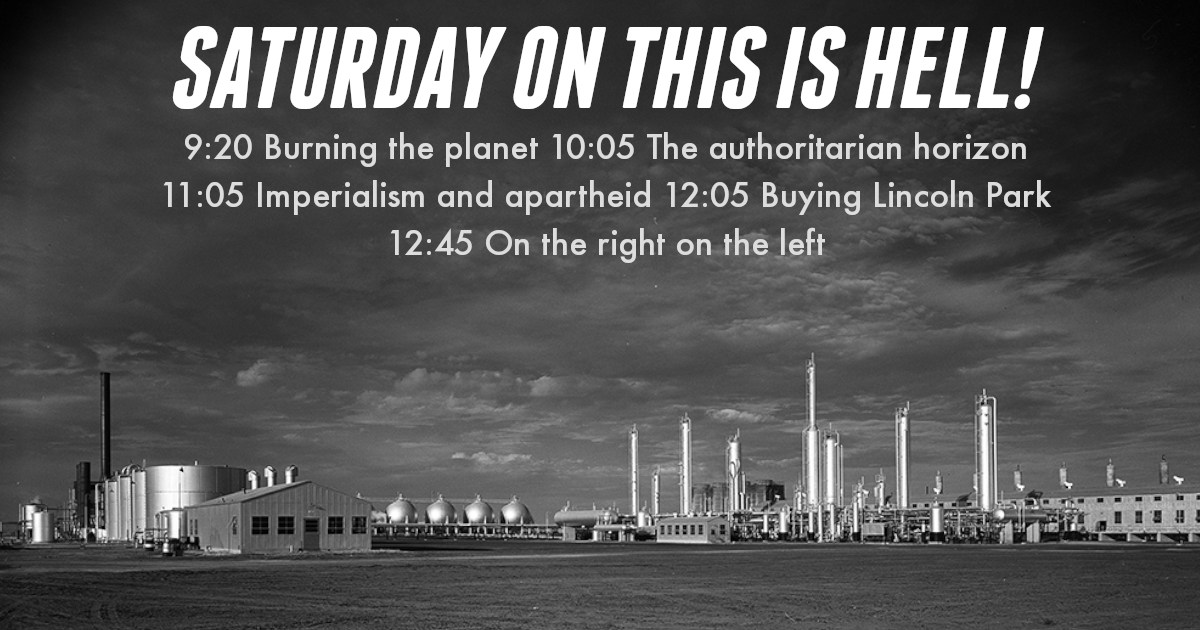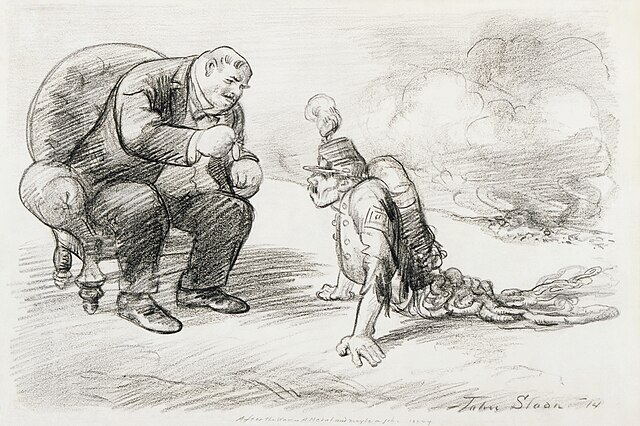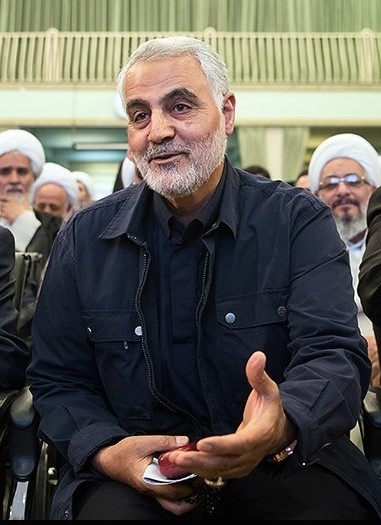Listen live from 9AM - 1:00PM Central on WNUR 89.3FM / stream at www.thisishell.com / subscribe to the podcast
9:20 - Energy researcher Simon Pirani explains how fossil fuels powered global capitalism and the climate crisis.
Simon is author of Burning Up: A Global History of Fossil Fuel Consumption from Pluto Press.
10:05 - Cultural critic Henry Giroux surveys a political horizon of hate, brutality and populist authoritarianism.
Henry is author of The Terror of the Unforeseen from Los Angeles Review of Books.
11:05 - Historian Gerald Horne explores a century of international struggle against apartheid and Jim Crow.
Gerald is author of White Supremacy Confronted: U.S. Imperialism and Anti-Communism vs. the Liberation of Southern Africa from Rhodes to Mandela from International Publishers.
12:10 - Policy analyst Daniel Kay Hertz examines the gentrification of Lincoln Park, and who got left behind.
Daniel is author of The Battle of Lincoln Park: Urban Renewal and Gentrification in Chicago from Belt Publishing.
12:45 - In a Moment of Truth, Jeff Dorchen wonders why the right thinks anyone cares about their feelings about the left.
Welcome to the Moment of Truth, the thirst that is the drink.
On Tucker Carlson’s show, Donald Dump, the would-be dictator, or, more formally, would-be penis potato, asserted that public excretion of human waste only began when he took office. This is a man ostensibly from New York City, long known for such street fragrances. He said it in the midst of producing a muesli of nonsense phrases. The comical thing was Tucker nodding and grunting in agreement, as if to say, “Right, that’s exactly when I started pissing on the streets. I think we all did. Yeah, yeah, George Soros paid us to do it.”
And then I realized – November 9, 2016 – that is in fact the date when I took my vow of public urination and defecation. I started pooping and peeing all over my neighborhood, as if I had no respect for myself or anyone else. It’s inappropriate and disgraceful, but, like incontinent fascist Tucker Carlson, I can’t help myself.
Astrocracy: rule by the stars. Not rule by asses, that’s any rule. And not rule by astro-crock, though it is a crock of magical thinking, much like the principle that ruthless, unbridled greed will somehow benefit the many rather than just the few. And put an end to poverty, which is a sick joke on us. Capitalism requires that a visible percentage of the would-be work force be in brutal poverty. Out of one crock into another crock. Actually, it’ll be the same crock. Either way, there are thousands upon thousands of people living on the street, right here in the most wealthy and spiritually airheaded nation on Earth, and that won’t change until we somehow un-brainwash ourselves from our radical capitalist indoctrination, and of course our worship of Disney magic, which I’ll get to later.
The advent of the reality TV president has of course led, inevitably, to the appearance of the flaky New Age self-help entrepreneur/guru as prospective nominee. I’m not saying that idiot has a chance in hell of becoming president, but after 2016, hell is apparently not the worst place to locate your chances. If you’re an idiot.
Do I belittle Marianne Williamson? With her prescription of solving the world’s problems with unicorn flatulence and echinacea enemas? Oh, by all means, I do belittle her. Is it sexist for me to do so? I feel the same way about Deepak Chopra, Bikram Choudry, Tony Robbins, Dr. Oz, any number of snake-oil... read more
Listen live from 9AM - 1:00PM Central on WNUR 89.3FM / stream at www.thisishell.com / subscribe to the podcast
9:20 - Theorist Sophie Lewis explores surrogacy's place in a new, liberatory gestational politics.
Sophie is author of Full Surrogacy Now: Feminism Against Family from Verso.
10:05 - Writer Ben Burgis explains why and how the left should talk about leftism.
Ben is author of Give Them an Argument: Logic for the Left from Zero Books.
11:05 - Sociologist Esther Sullivan examines housing insecurity in America's mobile home parks.
Esther Sullivan is author of from Manufactured Insecurity: Mobile Home Parks and Americans’ Tenuous Right to Place from University of California Press.
12:10 - Journalist Eric Blanc explains what labor and the left can learn from striking teachers.
Eric is author of Red State Revolt: The Teachers’ Strike Wave and Working-Class Politics from Verso.
12:45 - In a Moment of Truth, Jeff Dorchen critiques our magical-thought-leaders.
Welcome to the Moment of Truth: the thirst that is the drink.
I didn’t watch the Democratic debate, part 1. I decided I’d prefer to catch up the next day, piecing the event together from memes on Twitter. Find out what the jokes are and mentally reverse engineer them to build a vague impression of the inciting incidents. Because everyone knows that, whatever members of the Twublic are making the most persistent jokes about, that’s what will be setting the larger public’s nerves vibrating throughout the news cycle.
The first meme I encountered was Beto speaking Spanish, while the camera slowly dollied in on Cory Booker’s amusingly taken-aback face, looking wide-eyed and side-eyed at Beto, as the Curb Your Enthusiasm theme played. I love those Curb memes. I hate to see the passing of the Sad Trombone, but the Curb theme says so much more. It says your discomfort is comically petty, yet at the same time there’s something serious, perhaps even sexually threatening, underlying it. Something transgressive, maybe fatal. Maybe you, on whom the camera is dollying in, have transgressed, and been exposed, if only to yourself, or perhaps your perturbation is due to a transgression on the part of the person you are observing, whose words or actions are causing your comical expression, a transgression of which only you, with your particular knowledge or singularly-informed pettiness, can understand the full significance.
And, of course, the entire situation is a comment on the myriad shallow frustrations of contemporary life. It conveys a comical disgrace far more fraught than any sad trombone can express, or indeed any morose, put out, or discomfited member of the brass section. Larry David has given post-modernism its last great cultural gift. That is, late post-modernism. The worst kind of post-modernism, a used-up post-modernism, worn like a groove in a broken record, to put things in a vinyl idiom. A post-modernism completely out of ideas. A post-modernism sorely in need of cultural gifts. Thank you, Larry.
Booker’s face as he observes Beto’s Spanish soliloquy says it all. “Oh no he di’n’t. That white boy did not just take the reins of the people-of-color bandwagon with his fluent Tex/Mexspañol.” Don’t worry, Cory, we all know what’s going on. We’re watching. We know Beto is only barely... read more
Listen live from 9AM - 1:00PM Central on WNUR 89.3FM / stream at www.thisishell.com / subscribe to the podcast
9:20 - Live from Caracas, journalist Lucas Koerner reports on the media disinformation campaign aimed at Venezuela.
Lucas wrote the article There’s Far More Diversity in Venezuela’s ‘Muzzled’ Media Than in US Corporate Press for FAIR.
10:05 - Activist Andy Thayer explains what LGBT activism has lost - and must relearn - since the Stonewall uprising.
Andy wrote the article Why Stonewall Matters Today for Jacobin.
11:05 - Organizer D Hunter explores struggle and solidarity on the wrong side of the class war.
D is author of Chav Solidarity. D is raising funds for Lumpen: A Journal of Poor and Working Class Writing. Help him out.
12:05 - Writer Nathaniel Rich traces a 40 year history of knowing everything and doing nothing about climate change.
Nathaniel is author of Losing Earth: A Recent History from MCD Books.
12:45 - In a Moment of Truth, Jeff Dorchen reviews the memes of the first Democratic debate.
Welcome to the Moment of Truth, the thirst that is the drink.
After decades of failing to perfect it, humans still can’t admit that artificial intelligence is pretty stupid. Artificial intelligence is about as intelligent as artificial flowers are floral or artificial fruit is fruity. My favorite thing about humans trying to create artificial intelligence is our penchant for denial. We’re great at denying that things are going terribly wrong. Witness our reaction to global warming.
Have you seen HBO’s Chernobyl? All the young Stalinists today are calling it “anti-Soviet propaganda,” as if propaganda were necessary to find a totalitarian thought-policing bureaucracy unpalatable. Anyway, whether it hews to reality or not, it’s a great story of idiots in denial finally brought face-to-face with their hubris of thinking they can control technology.
Now, I don’t want to be a knee-jerk alarmist. People are so worried about artificial intelligence controlling us. I notice no one is worried about artificial legs walking all over us, or dentures biting us to death. And, listen, we’re going to need artificial intelligence as our natural intelligence rots and falls off. Which it seems to have been doing forever. You know who thought so? Seneca. Or Cicero. One of those bastards. Diogenes!
But we must recognize when enough is sufficient.
I saw a video of a robot being hit by humans with rods, wobbling a bit unsteadily but regaining its stability, taking the rods away from its assailants, then threatening to thrash them if they tried to attack again. One woman’s comment to this video, “Can we stop being mean to robots?” My comment, “Can we stop improving robots?” Because people act like it’s inevitable that robots are going to get more agile and effective. It’s not inevitable. We can say, “I don’t want to live in that Black Mirror episode where the robot dogs hunt people down. Don’t build those!”
It’s not whether you can think your way out of the paper bag, it’s with what style you get out of the paper bag, and what origami shape you fold the leftover bag into. Wait, no it’s not. It’s best to avoid getting trapped in the paper bag in the first place.
Think about the Turing test. Just think about it. There, you’ve already done more than the Turing test requires from a computer. All... read more
Listen live from 9AM - 1:00PM Central on WNUR 89.3FM / stream at www.thisishell.com / subscribe to the podcast
9:20 - Law scholar Katherine Franke examines the radical potential of reparations for Black Americans.
Katherine is author of Repair: Redeeming the Promise of Abolition from Haymarket Books.
10:10 - Writer Akemi Johnson explores the lives of Okinawan women living under US occupation.
Akemi is author of Night in the American Village: Women in the Shadow of the U.S. Military Bases in Okinawa from The New Press.
11:10 - Writer Zillah Eisenstein explains why the next revolution must be feminist and abolitionist.
Zillah is author of Abolitionist Socialist Feminism: Radicalizing the Next Revolution from Monthly Review Press.
12:00 - Journalist Aviva Stahl reports on isolation, torture and secrecy in an American prison.
Aviva wrote the report Force-Feeding Is Cruel, Painful, and Degrading—and American Prisons Won’t Stop for The Nation.
12:45 - In a Moment of Truth, Jeff Dorchen thinks about AI, and how stupid it is.








